- Home
- Joseph Bruchac
On This Long Journey
On This Long Journey Read online
Cover
Title Page
Dedication
Tennessee, 1837
October 1, 1837
October 2, 1837
October 3, 1837
October 4, 1837
October 5, 1837
October 6, 1837
October 7, 1837
October 8, 1837
October 11, 1837
October 12, 1837
October 13, 1837
October 14, 1837
October 15, 1837
October 16, 1837
October 17, 1837
October 18, 1837
November 3, 1837
November 5, 1837
November 6, 1837
November 8, 1837
November 9, 1837
November 10, 1837
November 20, 1837
November 24, 1837
November 30, 1837
January 2, 1838
January 3, 1838
January 5, 1838
January 8, 1838
January 15, 1838
January 16, 1838
February 1, 1838
February 14, 1838
March 3, 1838
March 5, 1838
March 6, 1838
March 8, 1838
April 18, 1838
April 19, 1838
April 20, 1838
April 22, 1838
April 26, 1838
April 29, 1838
May 12, 1838
May 15, 1838
May 17, 1838
May 25, 1838
May 26, 1838
June 4, 1838
June 5, 1838
June 7, 1838
June 11, 1838
June 12, 1838
June 13, 1838
June 14, 1838
June 17, 1838
June 20, 1838
June 25, 1838
June 30, 1838
July 1, 1838
July 2, 1838
July 3, 1838
July 4, 1838
July 5, 1838
July 6, 1838
July 7, 1838
July 8, 1838
July 9, 1838
July 10, 1838
July 11, 1838
July 12, 1838
July 13, 1838
July 14, 1838
July 16, 1838
July 19, 1838
July 22, 1838
July 30, 1838
August 2, 1838
August 3, 1838
August 8, 1838
August 9, 1838
August 12, 1838
August 16, 1838
August 18, 1838
August 23, 1838
August 28, 1838
September 1, 1838
September 3, 1838
September 4, 1838
September 8, 1838
September 12, 1838
September 15, 1838
September 16, 1838
September 19, 1838
September 20, 1838
September 23, 1838
September 26, 1838
September 28, 1838
October 2, 1838
October 3, 1838
October 5, 1838
October 6, 1838
October 7, 1838
October 9, 1838
October 10, 1838
October 11, 1838
October 12, 1838
October 13, 1838
October 15, 1838
October 19, 1838
October 20, 1838
October 21, 1838
October 22, 1838
October 25, 1838
November 5, 1838
November 6, 1838
November 9, 1838
November 10, 1838
November 11, 1838
November 12, 1838
November 13, 1838
November 14, 1838
November 16, 1838
November 17, 1838
November 19, 1838
November 21, 1838
November 25, 1838
December 2, 1838
December 4, 1838
December 6, 1838
December 9, 1838
December 12, 1838
December 16, 1838
December 25, 1838
January 1, 1839
January 4, 1839
January 5, 1839
January 8, 1839
January 13, 1839
January 14, 1839
January 15, 1839
January 18, 1839
January 20, 1839
January 24, 1839
January 27, 1839
February 1, 1839
February 4, 1839
February 6, 1839
February 8, 1839
February 10, 1839
February 12, 1839
February 17, 1839
February 19, 1839
February 22, 1839
Epilogue
Life in America in 1837
Historical Note
About the Author
Acknowledgments
Copyright
October 1, 1837
Bear showed himself to me this morning. The river far below was shining in the rising sun as I sat on the slope. I had just gone to the river, washed my hands and face in its waters, and thanked the old Long Person for its blessing.
This is all I can write for this evening. I hear my mother calling me. Napoleyan has gotten out of his stall. He will not run away, but neither will he move. When this happens I am the only one who can convince him to go back into the barn. Mules!
October 2, 1837
Got up before sunrise. Fed animals. Then took two broadsword corn dumplings from the basket Mother left out on the porch last night. Ate them as I walked our line of rail fence after letting out the cows from the barn. The dumplings were delicious, and I wished I had taken more.
No rails broken or knocked loose by Napoleyan. But I see I will have to replace a good many rails before winter. I have already readied one log and got out the maul and the wedges for the splitting. It is my job to do all those things Father and I once did together. It will be the first time I have ever tried rail-splitting by myself.
Tried to give Emily and Ruthie a hand with the scalybarks that my sisters and I gathered from our hickory trees and which Mother dried on the rack beside the fire. When I was a small child, before Emily and Ruthie were born, my mother would let me help her prepare the scalybarks with a flat stone and sieve them in the basket to get rid of the hulls. Now my sisters refuse to allow me to help them. As if I did not know how to do it as well as they do!
Later today, if we are lucky, Mother will make connuche. It is our favorite! We will have it with some of the honey I gathered from the hollow in the big beech tree last week. Just as my father taught me, I used a bundle of leaves to smoke the hollow and continually sang Father’s song to the bees. Father said that song was taught to his great-grandfather by the bees. I only took half the honey and was not stung even once, though the bees landed on my face and in my hair and buzzed in a rhythm much like that of my song. I left some white beads as a gift for the bees.
I spoke once with Reverend Samuel Worcester about my remembering our Cherokee stories and our old ways. He agreed that there is no harm in
our stories, although he says those in the Bible are more instructive. He holds that many of our ways are admirable. Though he and Reverend Elizur Butler are both white men, I trust their honesty. Even the Feeler, who like the majority of our people will not hear of converting from his pagan ways, has respect for them.
“They do as they speak,” the Feeler said when the two missionaries refused to swear allegiance to George and agree to the Removal of our people to the west. Because of that, Reverends Worcester and Butler served one year and four months in a Georgia jail.
When they were released, the Feeler was one of the crowd of Cherokees who met them outside the jail and took their hands and accompanied them on their journey back to the Mission School at Brainerd. That gratified me, since the Feeler is my great-uncle.
That is all I have time to write for now. My taper is about burned down, and I have covered more than the page I had promised myself I would fill. Now that the Mission Schools have been closed down, Reverend Butler says, there is a need for every voice to be heard. I believe that is especially true in this time when even some of our own people have turned against us. I refer here, of course, to the Treaty of New Echota. I will write more tomorrow.
October 3, 1837
This evening, when my two sisters, Emily and Ruthie, were asleep and the house was quiet, I picked up my quill to sharpen it before writing. Then my mother asked me what I was doing.
Sometimes when my mother asks this, it is her way of reminding me that I have more to do. In our Cherokee way, it is the women who are the real heads of our households. Our homes and their contents belong to the women and the children to their mother’s clan. At times, when I hear my mother’s soft, strong voice, I have but to close my eyes to picture her as the Beloved Woman who sat beside the War Chief and the Peace Chief, those powerful men heeding her wise counsel.
So, I immediately put down my pen. What had I forgotten to do? I had a good stock of split wood in the wood box by the fireplace. I had repaired the loose shingles on our roof and replaced the leather top hinge of our back door. I had cleaned out the barn, placing the rotted straw and manure on our manure pile, which we will use for our spring gardens. I had good luck hunting today, bringing in the same deer I had hoped to encounter the day I met the Bear. That deer now hung outside. Having used it to such good effect today, I felt my grandfather’s gun also needed attention before I replaced it over the fireplace, and so I had thoroughly cleaned and polished it.
Then I understood. My journal was on the table in front of me, the ink bottle uncorked, my quill next to it, the knife with which I had been sharpening the nib still in my hand.
I felt foolish. I should have spoken with my mother about my journal. It was she who insisted, after Father was killed, that I must continue to follow the learning of the white man’s ways. She wanted me to return to the Mission School, even though it left her as a widow without a son to assist her about the house. My father was murdered three years ago, when I was thirteen. My two sisters, three and five years younger than me, are not as great a help as I am. I said that I should stay and help her. But my mother was as firm as a stone. So I went back to school. I remained there until it was closed this past year. It is to be converted into a fort to hold the troops, both United States Regulars and State Militias, that have begun arriving in our small Cherokee Nation in an ever-increasing flow.
I explained in a rush of words what I was about, that I was trying to make a record of the things happening to us and those we know in these difficult times. I apologized for not telling her first before all others.
She smiled and placed her hands upon mine. “Wado, my son,” she said. “Thank you. You honor me.”
Then she sat down beside me to listen. I read her all that I had written. When I finished, my mother rose and placed another log onto the fire. “You do well,” she said. “But I have one question.”
“Ask it,” I said, knowing that any question my dear mother might ask would be one I needed to hear.
Mother said it seemed that when I write in this journal I am talking to someone I trust. She said I write as if that person is a good friend.
I agreed with her. I do feel that this journal is my friend.
“If we trust a friend, we give them our names,” she said.
My mother was right. So I shall begin again with you, my reader and my friend.
Osiyo! Allow me to introduce myself. The Ani-Kawi, the Deer, is my clan. My mother is known by the name of Sallie Littledeer. My father was known as Twokiller. My two sisters, as mentioned earlier, wish to be called Emily and Ruthie, though their Cherokee names are quite different. I have also been known by more than one name already in my short life of only sixteen winters. My Cherokee name is Gogisgi, which means “Smoke.” At the Mission School they gave me the name of Jesse. Jesse Smoke, I became, and was so recorded in the Mission records. My friends call me Jess, and you may do the same.
October 4, 1837
Started splitting rails for the fence today. Weather unusually hot. Four turkey buzzards circled overhead as I labored behind the barn with the log, which was too stubborn to allow me to split it, spitting out one wedge after another. By the time I was done it was quite dark.
My hands were so stiff from holding the ax, they felt like blocks of wood. My mother rubbed bear grease into my hands and crooned a song I had not heard her sing to me since I was a baby. For some reason my eyes became filled with tears as she sang, but she did not notice. Gradually the feeling returned to my fingers, and I could hold the wooden bowl of bean soup that my sister Ruthie placed in my hands. I will write more tomorrow.
OCTOBER 5, 1837
Last night, after everyone else went to bed, I sat by the fire for a long time and looked up at the long rifle hanging above the mantel. I had many thoughts, but my hands were too sore to write. My time away at school has made it hard for me to get used to such manual labor again as I must do now. Today my hands no longer are so stiff, and so I will now try to write more about the Bear that I did not shoot and also about that weapon, which belonged first to Old Turkey, my grandfather. It is the gun he was given by the Americans to carry into the Battle of Horseshoe Bend in 1814.
My grandfather, Old Turkey, was one of those who swam the river and assaulted the Red Stick barricade and by God broke through. He was not one of the ones who tallied the enemy dead by cutting off their noses and bringing them in a bag back to the general. Not that he would have shrunk from doing that. But by then he was dead with a Red Stick arrow through the side of his throat.
So it was his gun and not him that came home from the Creek War. It was not much of a trade, but was worth more than Old Hickory’s word. Jackson promised to be friends to the Cherokee forever. Then he ran for president on an Indian Removal pledge. His word to the Indians was worth less than a hill of beans.
Old Turkey’s son, my own father, carried that gun to hunt with as I do now. My father never fired it at a human being, even though doing so might have saved his life when he was ambushed by that gang of white men.
October 6, 1837
Was surprised today to be given some of the connuche for my breakfast. Mother had saved it for me. She had mixed not only honey but also strawberry preserves into the hickory nut mush. My sisters are quite greedy for it, especially Emily. Her Cherokee name, which she no longer uses since getting her new name at the daily Mission School, is Laughs When She Sees Food.
Did my usual chores, but no further splitting of rails. I shall do that later. Instead, I spent the rest of the morning working on the wood pile. Then, being the tallest one in our home, it was my job in the afternoon to help Mother rearrange the strings of beans and folded-over corn leaves hanging from our rafters. The scorched corn leaves would be used to wrap corn dumplings. Also shifted the planks on which we had spread out the quarter cabbages to dry. Space was needed for the apple slices, which we had on ash splints next to the fire.
Long ago, the Feeler says, the people had nothing to hunt. They needed food. So one whole clan of our people sacrificed themselves. They said, “We will turn ourselves into Bears. Then you can hunt us, eat our flesh, and use our skins for blankets.”
Maybe I was thinking of the Feeler’s words when that big boar Bear came into sight. It made me think about that sacrifice, and I held my fire. Maybe it was something else. For the Bear stopped and reared up on his hind legs and turned around twice. Next he fell down onto all fours and shuffled toward the direction of the Darkening Land, the west. Then he turned his head to look in my direction. It seemed as if the Bear were beckoning me to follow him or saying to me that I should soon be traveling in that same direction. He bobbed his head up and down and from side to side as bears do when they greet each other. Then he turned back toward the west and began to walk. I watched until he was lost in the trees.
October 7, 1837
Good news today. Everyone is excited. A rider came in to tell everyone that John Ross is on his way. Kooweeskoowee is coming, he shouted, the White Bird will soon talk to the people.
October 8, 1837
There was much excitement about the visit of Chief John Ross. Everyone gathered to listen to him speak from the back of his horse. He did not get down, as he had many more stops to make that day before returning to Washington. Also, because he is so short, he can be better seen by all when mounted.
Chief Ross will be sending a Cherokee delegation to Florida soon. They will try to talk between the U.S. Army and the Seminoles, who are fighting a war to keep from being removed. Our Chief and our Council are worried that the white people will think the Cherokees are like the Seminoles and believe we are warlike and not to be trusted.
The gist of his speech to us was clear and simple. We must not prepare to be removed, despite Commissioner Schermerhorn and the Treaty of New Echota. Despite what the Ridge and the others who betrayed us did, we must not give up. We must cling to our land. We must plant our crops next spring. We also must not resist or fight the whites by force of arms. We must be good neighbors to our white brothers and sisters. It is through the courts, not the gun, that we will resist.

 Peacemaker
Peacemaker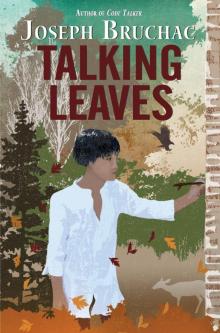 Talking Leaves
Talking Leaves Found
Found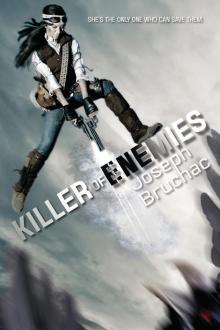 Killer of Enemies
Killer of Enemies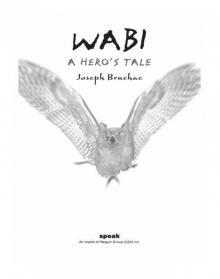 Wabi
Wabi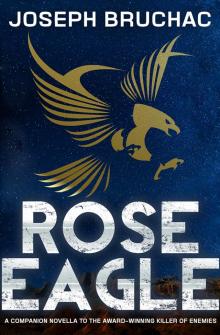 Rose Eagle
Rose Eagle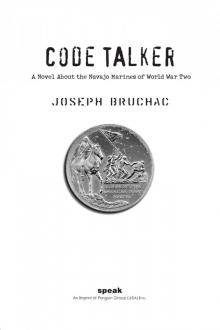 Code Talker
Code Talker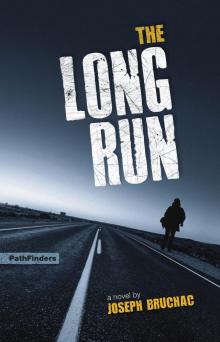 The Long Run
The Long Run Dragon Castle
Dragon Castle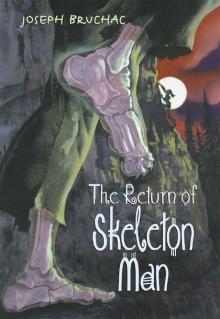 The Return of Skeleton Man
The Return of Skeleton Man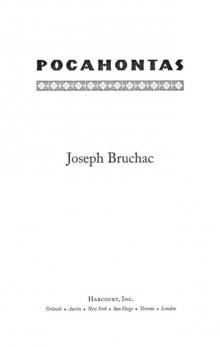 Pocahontas
Pocahontas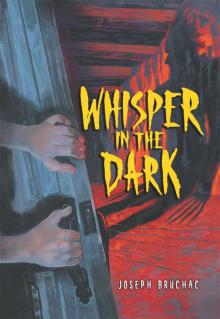 Whisper in the Dark
Whisper in the Dark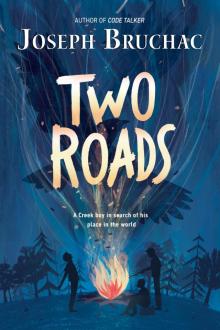 Two Roads
Two Roads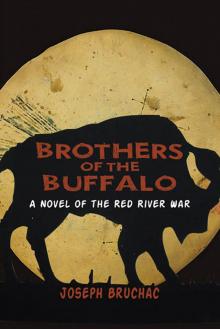 Brothers of the Buffalo
Brothers of the Buffalo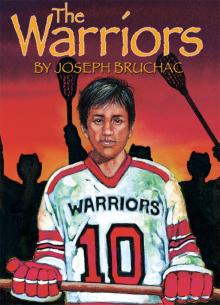 The Warriors
The Warriors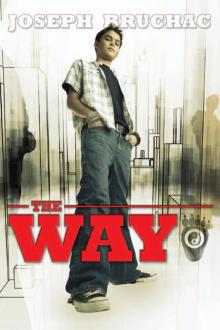 The Way
The Way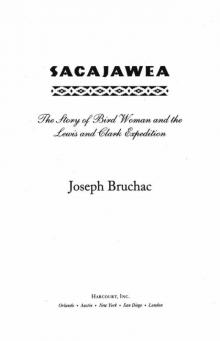 Sacajawea
Sacajawea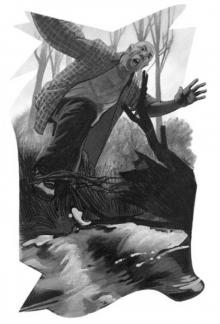 Night Wings
Night Wings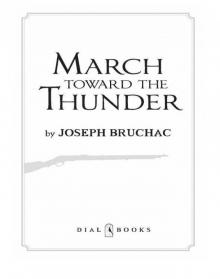 March Toward the Thunder
March Toward the Thunder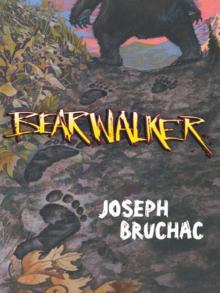 Bearwalker
Bearwalker Skeleton Man
Skeleton Man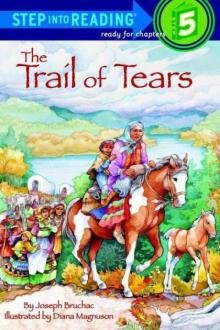 The Trail of Tears
The Trail of Tears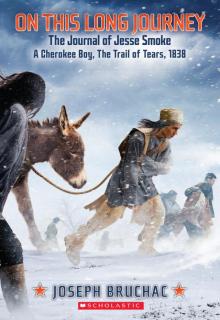 On This Long Journey
On This Long Journey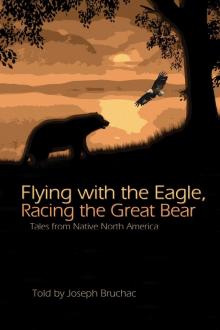 Flying with the Eagle, Racing the Great Bear
Flying with the Eagle, Racing the Great Bear